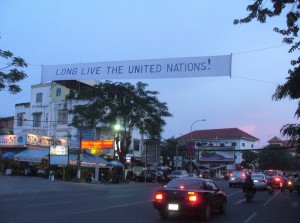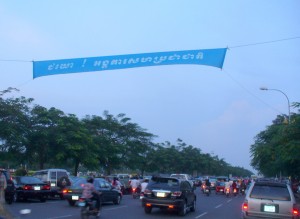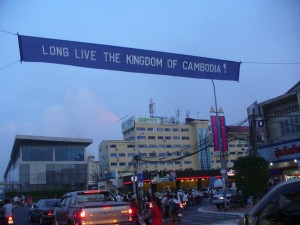The Mirror, Vol. 14, No. 687
I have never been absent from Cambodia for such a long time since my arrival at the end of May 1990. There were many personal challenges during these weeks – starting with a meeting with some high-school time classmates who graduated with me in 1953. Some are no more – no surprise, considering the years passed since.
Then, as I had reported also in The Mirror, I became inevitably aware that the population pyramids in Cambodia and in Germany are so different. But it is not yet clear what this will mean for the future of employment possibilities in Cambodia, where most available job positions are already occupied for years to come – but a large number of new graduates are looking forward to jobs.
A Cambodian young journalist, Keo Kounila, has approached this future dilemma not form the angle of statistics, but asking the fundamental question: What can young Cambodians do for Cambodia? Only when leaving traditional patterns hoping for high positions in society, but individually searching and deciding on new ways, seems to be promising.
But there is also the social, economic, and political context to be considered. There were many discussion – in the broader public – and there were pronouncements by the political leadership in the past which raised questions about the future directions of Cambodia. There had been more or less serious frictions with all United Nations Special Rapporteur for Human Rights in Cambodia – most recently when Prof. Subedi had stated: “I call on the Royal Government of Cambodia to introduce appropriate measures to enhance the independence and capacity of the judiciary to enable it to function as an institution capable of providing justice to all in Cambodia.”
On the other hand there have also been voices from abroad, claiming that the Paris Peace Agreements of 1991 have been “buried and put to death by Hanoi government and puppet government of Phnom Penh with the connivance of former Cambodian nationalist resistance on the borders. Their aim was simply to destroy Cambodia, her people and annihilate Khmer nation.” Such statements seem to reflect a deep gap of non-communication with the day-to-day life of the society in Cambodia, moving ahead in spite of existing problems. The Khmer nation is not about to be annihilated.
The flags, decorating Phnom Penh on this UN Day of 24 October, are a sign saying: Whatever the difficulties on the way may be, the direction is clear. Cambodia is a member of the community of the United Nations, and whatever will happen in this community, looking ahead, will also be heard in Cambodia: the need to work towards the eight UN Millennium Development Goals, and, as the newest achievement after four years of wrangling with opposing and reluctant governments that did not want to give up certain controls over the women in their countries, there is now the United Nations Entity for Gender Equality and the Empowerment of Women.
The UN Secretary General, expected in Phnom Penh for an official visit visit in Cambodia from 26 to 28 October 2010, had said about the creation of the UN Entity for Gender Equality and the Empowerment of Women:
Today’s action does more than consolidate United Nations offices, it consolidates United Nations strengths. UN Women will significantly boost UN efforts to promote gender equality, expand opportunity, and tackle discrimination around the globe. It is also an important step in our wider effort to strengthen UN system-wide coherence to meet the challenges of the 21st century.
UN Women is a recognition of a simple truth: Equality for women and girls is not only a basic human right, it is a social and economic imperative. Where women are educated and empowered, economies are more productive and strong. Where women are fully represented, societies are more peaceful and stable.
That is why I have made gender equality and the empowerment of women one of my top priorities — from working to end the scourge of violence against women, to appointing more women to senior positions, to efforts to reduce maternal mortality rates.
Our challenge now is to make UN Women fully operational. I will continue my outreach with Member States and civil society in seeking a dynamic Under-Secretary-General to lead UN Women.
On 14 September 2010, the former President of Chile, Michelle Bachelet, has already been appointed to head this new high-profile UN women’s agency.
This does not mean that everybody should now sit back and wait what the UN bureaucracy will do – it is instead an encouragement for the societies in the United Nations – for women and men – to work and struggle to realize the goals for which this new office has been created: to promote gender equality, expand opportunities, and to tackle discrimination around the globe and in one’s own country and society.
That the call of the day combines the United Nations and the Kingdom of Cambodia is an encouragement and a challenge – not to work together towards these goals is not an acceptable option.
For me, it is good to be back again in Cambodia, to be present and maybe also to be part of this work, as the people of the Kingdom of Cambodia become more and more active members of the international fellowship of the countries of the United Nations, realizing an ever more human, just, and peaceful society.
Please recommend The Mirror also to your colleagues and friends.




Recent Comments